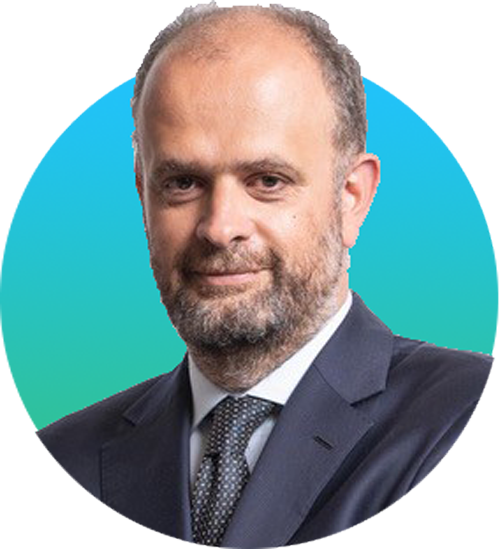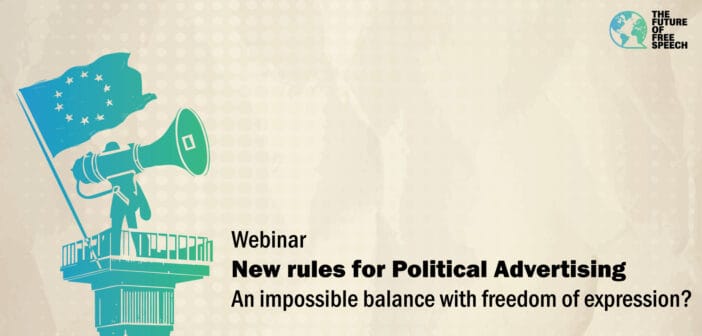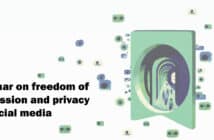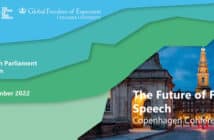You are invited to a morning seminar on the regulation of online political advertising in Europe and its impact on freedom of expression.
Time: The 9th of May. From 3:30 to 5:00 PM (CET)
Place: Online. Register here: https://justitia.nemtilmeld.dk/26/
Online political advertising can influence public opinion and elections, but it also raises issues of transparency, accountability, and fairness. The EU is considering a new legal instrument to regulate online political ads across its member states. The law would require online platforms to disclose information about who pays for political ads, how they are targeted and how much they spend. It would also limit the use of micro-targeting techniques based on personal data.
However, some critics argue that the law could threaten freedom of expression and media diversity. They claim that the law could impose excessive burdens on online platforms and advertisers, stifle political speech and innovation, create legal uncertainty and inconsistency across different jurisdictions, and undermine self-regulation efforts by the industry.
In this seminar, we will discuss these arguments and how the EU can balance its goals of transparency, accountability, and fairness with freedom of expression and media diversity.
Articles by speakers on the topic:
Andrei Richter – For Propaganda Without Disinformation: Draft EU Regulation on Political Advertising
Speakers

Joan Barata | Senior Legal Fellow | The Future of Free Speech
Joan Barata works on freedom of expression, media regulation, and intermediary liability issues. He is a Senior Fellow at Justitias Future Free Speech project. He is a Fellow of the Program on Platform Regulation at the Stanford Cyber Policy Center. He has published a large number of articles and books on these subjects, both in academic and popular press. His work has taken him in most regions of the world, and he is regularly involved in projects with international organizations such as UNESCO, the Council of Europe, the Organization of American States or the Organization for Security and Cooperation in Europe, where he was the principal advisor to the Representative on Media Freedom. Joan Barata also has experience as a regulator, as he held the position of Secretary General of the Audiovisual Council of Catalonia in Spain and was member of the Permanent Secretariat of the Mediterranean Network of Regulatory Authorities.

Oreste Pollicino | Professor of Constitutional Law | Bocconi University
Professor of Constitutional Law in Bocconi. Teach the courses on GDPR, Media Law, Internet Law and the Director of the LLM in Law of Internet Technologies in Bocconi University. Oreste is Honest Broker appointed by the European Commission for the negotiation on the ‘European code of practice on disinformation’; Member of the Executive Board, European Union Agency for Fundamental Rights, Vienna; Board Member of the Digital Library, Ministry of Culture; Member of the European Commission Sounding Board of the Multistakeholder in the fight against online disinformation; Participant to the Conseil of Europe Ad Hoc Committee on Artificial Intelligence (CAHAI); Italian member of the OECD Global Partneship on Artificial Intelligence.

Krisztina Rozgonyi | Senior Scientist| Austrian Academy of Sciences
Dr Krisztina Rozgonyi is Senior Scientist at the Institute for Comparative Media and Communication Studies (CMC) of the Austrian Academy of Sciences (ÖAW) and a senior international media, telecommunication and IP legal and policy expert. She works with international and European organizations (such as the ITU/UN, UNESCO, Council of Europe, European Commission, World Bank InfoDev, OSCE and BBC MA), with national governments, and regulators as an adviser on media freedom, spectrum policy and digital platform governance. Before her academic engagement, she was a regulator leading a Telecommunication Regulatory Authority in an EU Member State. Her expertise lies in media and telecommunications policy-making and regulation, with extensive experience in legal reform work. Dr Rozgonyi also manages a platform at the Department of Communication of the University of Vienna to bridge research with policy agendas.

Giovanni De Gregorio | Professor | Católica Global School of Law
Giovanni De Gregorio is a professor of Law and Technology at Católica Global School of Law and Católica Lisbon School of Law. His research interests include constitutional law, human rights, freedom of expression, privacy, and data protection law. He has authored several publications, including the monograph “Digital Constitutionalism in Europe,” and edited books such as “Constitutional Challenges in the Algorithmic Society” and “Blockchain and Public Law: Global Challenges in the Era of Decentralisation.” Giovanni has received academic awards and is a member of various global academic and policy networks, including the Dynamic Coalition on Platform Responsibilities and the Internet and Jurisdiction Policy Network.

Andrei Richter | Professor at Comenius University
Andrey Rikhter (Andrei Richter) is Researcher Professor at Comenius University in Bratislava and Adjunct Professor of the Webster University in Vienna.
In 2011-22 he served as Director and a Senior Adviser at the Office of the OSCE Representative on Freedom of the Media.
An Austrian citizen, Richter holds university degrees in law, journalism and foreign languages, a doctorate of philology in Russia and a habilitated professorship in media studies from Slovakia.
He has authored more than 250 publications on media law and policy in Russian, English, Armenian, Azeri, Bosnian, Croat, German, French, Serbian, Slovak, Tajik and Ukrainian, including the standard media law textbook for journalism students in the Russian Federation (2002, 2009, 2016), a textbook on international standards of media regulation (2011), a textbook on online media law (2014), and a book on censorship and freedom of the media in post-Soviet countries, published by UNESCO (2007). Dr Richter sits on the editorial boards of a number of international journals on communications and the media.
Andrei Richter was a long-time professor at the School of Journalism, Lomonosov Moscow State University, where he chaired a department in media law and history. He founded and led Moscow Media Law and Policy Center, a Russian NGO in 1990-2010s.
He also served as a commissioner at the International Commission of Jurists and the Chair of the Law Section of the International Association for Media and Communication Research.




